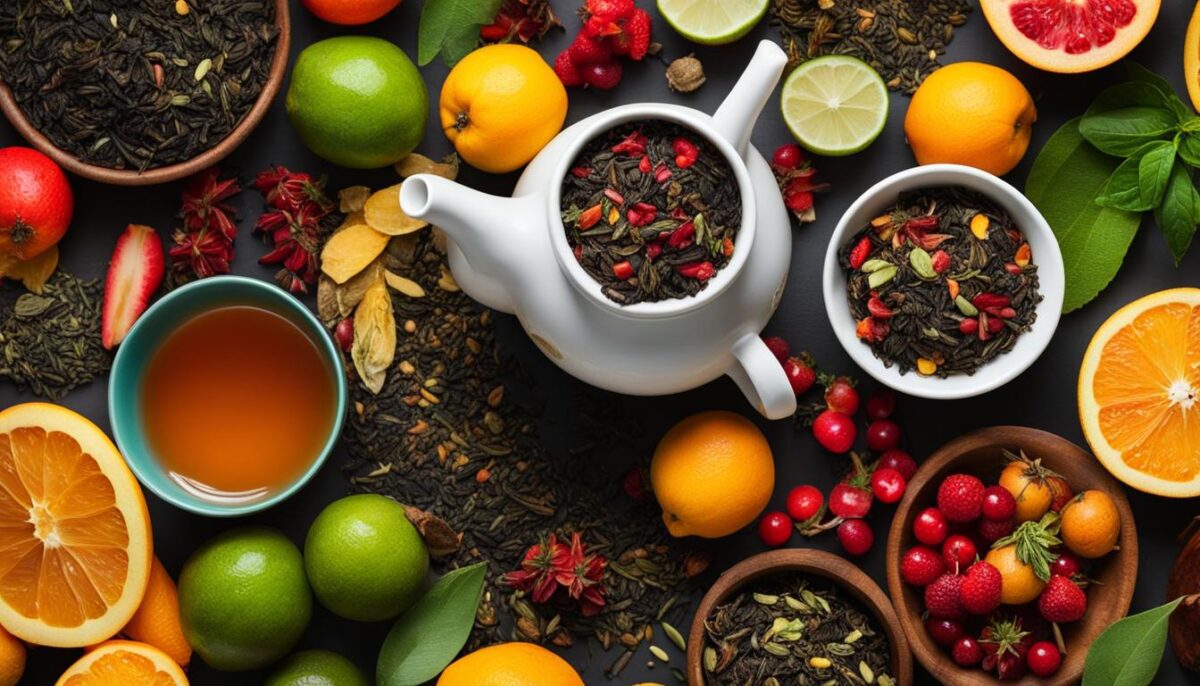Matcha
The Best Teas for Your Health
Tea is not only a soothing beverage but also offers numerous health benefits. From boosting cognitive function to protecting against age-related damage, tea is a versatile and beneficial choice for your health. Let’s explore the top teas that can enhance your well-being.
Whether you’re a tea connoisseur or just starting to explore the world of tea, there’s a wide variety of options to choose from. Each tea has its own unique flavor and potential health benefits. Let’s dive into the best teas for your health:
Key Takeaways:
- Tea offers a multitude of health benefits, including cognitive function and protection against age-related damage.
- Chamomile tea can help promote better sleep and support immune health.
- Ginger tea is known for alleviating nausea and improving digestion.
- Peppermint tea can support a healthy digestive system and relieve bloating.
- Hibiscus tea has been found to help manage blood pressure and offer potential cardiovascular benefits.
Chamomile Tea for Restful Sleep and a Boosted Immune System
Chamomile tea, a delightful herbal infusion with a delicate floral flavor, has long been cherished for its calming properties and potential health benefits. This caffeine-free tea is renowned for its ability to promote restful sleep and support a healthy immune system.
Studies have found that chamomile tea may help improve sleep quality by reducing anxiety and promoting relaxation. It contains compounds like apigenin, which can bind to certain receptors in the brain and have a mild sedative effect. Soothing and comforting, a cup of chamomile tea before bedtime can help you unwind and prepare for a peaceful night’s rest.
Aside from its sleep-enhancing properties, chamomile tea also offers potential benefits for immune health. It has been found to have anti-inflammatory effects, which can help support a healthy immune system. Additionally, chamomile tea may provide relief for symptoms of premenstrual syndrome, such as irritability and menstrual cramps, due to its calming and anti-inflammatory properties.
The Benefits of Chamomile Tea:
- Promotes restful sleep
- Supports a healthy immune system
- Reduces anxiety and promotes relaxation
- Provides relief for premenstrual syndrome symptoms
- Has anti-inflammatory effects
Experience the soothing benefits of chamomile tea by incorporating it into your daily routine. Whether you enjoy it hot or iced, chamomile tea can be the perfect companion for relaxation and overall well-being.
| Health Benefits of Chamomile Tea | How to Prepare Chamomile Tea |
|---|---|
|
|
Ginger Tea for Nausea and Digestive Health
Ginger tea has long been recognized for its ability to alleviate nausea and support digestive health. Whether you’re experiencing morning sickness during pregnancy or dealing with digestive distress, ginger tea can provide relief and promote overall well-being.
One of the key benefits of ginger tea is its ability to ease nausea. The compounds found in ginger, such as gingerol and shogaol, have been shown to have antiemetic properties, which can help reduce feelings of queasiness and vomiting. By sipping on ginger tea, you can soothe an upset stomach and settle your digestive system.
Not only does ginger tea help with nausea, but it also supports digestive health. It stimulates the production of digestive enzymes, which aids in the breakdown of food and the absorption of nutrients. Additionally, ginger tea can help relax the muscles in the gastrointestinal tract, reducing bloating and cramping.
Ginger Tea Recipe:
Ingredients:
- 1 tablespoon of freshly grated ginger
- 1 cup of boiling water
- 1 teaspoon of honey (optional)
Instructions:
- Place the grated ginger in a cup.
- Pour boiling water over the ginger.
- Let the tea steep for 5-10 minutes.
- Strain the tea into another cup.
- Add honey to taste, if desired.
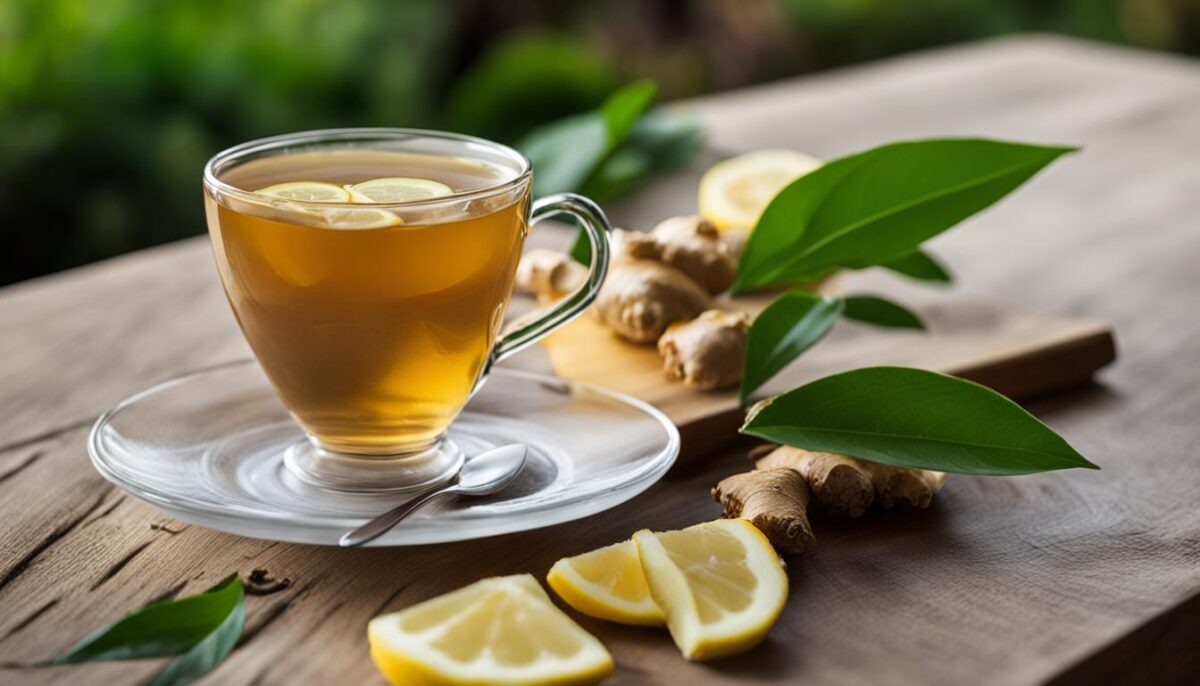
Ginger tea is a natural and soothing remedy for nausea and digestive discomfort. Incorporating this warm and comforting beverage into your daily routine can help support your digestive health and provide relief from various gastrointestinal issues. So, brew yourself a cup of ginger tea and enjoy its benefits for a happier tummy!
Peppermint Tea for a Healthy Digestive System
When it comes to supporting a healthy digestive system, peppermint tea is a popular choice. This refreshing herbal tea has been enjoyed for centuries and offers a range of benefits, particularly in aiding digestion and relieving bloating. Peppermint tea contains natural compounds, such as menthol, that have been found to have a relaxing effect on the muscles of the gastrointestinal tract, helping to ease discomfort and promote smoother digestion.
One of the key advantages of peppermint tea is its ability to relieve bloating. Bloating can be caused by a variety of factors, including trapped gas and poor digestion. Peppermint tea acts as a natural carminative, which means it can help to reduce gas and bloating by relaxing the muscles in the intestines, allowing gas to be expelled more easily. By enjoying a cup of peppermint tea after a meal, you can help prevent and alleviate uncomfortable bloating.
“Peppermint tea contains natural compounds, such as menthol, that have a relaxing effect on the muscles of the gastrointestinal tract, helping to ease discomfort and promote smoother digestion.”
In addition to its digestive benefits, peppermint tea is also caffeine-free, making it a great option for those looking to unwind and relax. Whether enjoyed in the morning or before bedtime, peppermint tea offers a soothing and refreshing beverage that can be enjoyed throughout the day.
| Benefits of Peppermint Tea | How to Incorporate Peppermint Tea Into Your Routine |
|---|---|
|
|
In summary, peppermint tea is a fantastic choice for promoting a healthy digestive system. Its natural compounds and calming properties make it an effective remedy for bloating and aiding digestion. Whether enjoyed hot or cold, this caffeine-free herbal tea can be easily incorporated into your daily routine to support your overall well-being.
So why not reach for a comforting cup of peppermint tea and give your digestive system the support it needs?
Hibiscus Tea for Blood Pressure Management
Hibiscus tea is a flavorful and vibrant herbal tea that offers more than just a delightful taste. It has been found to have potential benefits for managing blood pressure and improving cardiovascular health. Studies have shown that regular consumption of hibiscus tea can help lower blood pressure in individuals with stage one hypertension.
One study conducted on individuals with pre- and mild hypertension found that drinking hibiscus tea daily for six weeks led to a significant reduction in both systolic and diastolic blood pressure levels. The tea’s ability to reduce blood pressure may be attributed to its high content of antioxidants, specifically flavonoids, which have been shown to have a beneficial effect on blood vessel health and function.
“Regular consumption of hibiscus tea can help lower blood pressure in individuals with stage one hypertension.”
In addition to its blood pressure-lowering effects, hibiscus tea may also offer other cardiovascular benefits. Research suggests that it may help reduce cholesterol and blood sugar levels, both of which are important factors in maintaining overall heart health. Furthermore, hibiscus tea has demonstrated potential anti-inflammatory properties, which can further support cardiovascular well-being.
It’s worth noting that while hibiscus tea can be a great addition to a heart-healthy lifestyle, it should not be relied upon as a sole treatment for high blood pressure or other cardiovascular conditions. It is always important to consult with a healthcare professional for proper diagnosis and guidance.
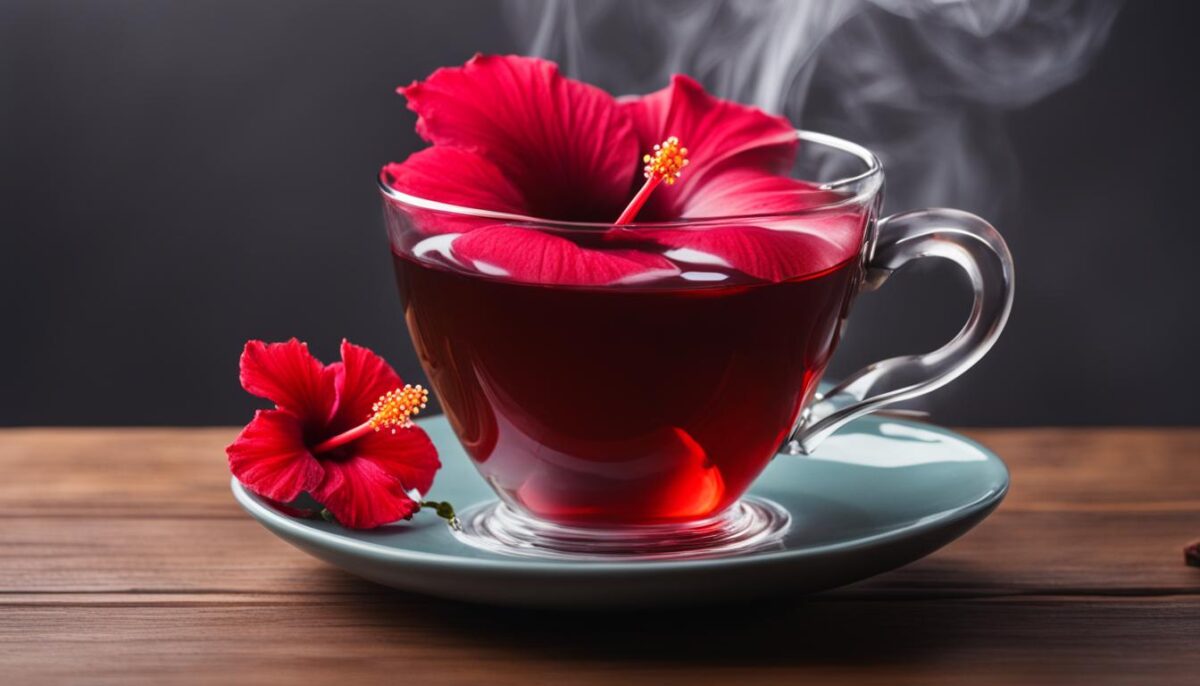
| Benefits of Hibiscus Tea | Details |
|---|---|
| Lowering Blood Pressure | Hibiscus tea has been shown to reduce both systolic and diastolic blood pressure in individuals with pre- and mild hypertension. |
| Reducing Cholesterol and Blood Sugar Levels | Regular consumption of hibiscus tea may help lower cholesterol and blood sugar levels, promoting heart health. |
| Potential Anti-Inflammatory Effects | Hibiscus tea exhibits anti-inflammatory properties, which can contribute to overall cardiovascular well-being. |
With its bold flavor and potential health benefits, hibiscus tea is an excellent choice for those looking to incorporate a refreshing and heart-healthy beverage into their daily routine. Whether enjoyed hot or cold, this vibrant herbal tea offers a delightful way to support your cardiovascular health.
Fennel Tea for Menopause Symptom Relief
Menopause is a natural transition that occurs in a woman’s life, often accompanied by a range of uncomfortable symptoms. Fennel tea, known for its digestive benefits, may offer relief from some of these symptoms. The unique properties of fennel tea can help balance hormones and alleviate menopausal discomfort, making it a valuable addition to your wellness routine.
During menopause, hormonal imbalances can cause hot flashes, night sweats, mood swings, and sleep disturbances. Fennel tea contains phytoestrogens, plant-based compounds that mimic estrogen in the body. These phytoestrogens can help regulate hormone levels and minimize the intensity of menopausal symptoms. By promoting hormone balance, fennel tea may provide relief, allowing women to navigate this natural transition more comfortably.
“Fennel tea’s hormone-balancing properties can alleviate menopausal discomfort and promote overall well-being.”
Additionally, fennel tea has been used for centuries to support digestion and ease digestive issues. The tea’s carminative properties can help reduce bloating and discomfort, which may be exacerbated during menopause. By soothing the digestive system, fennel tea offers a holistic approach to managing menopause symptoms, addressing both hormonal and physical well-being.
To incorporate fennel tea into your routine, simply steep one teaspoon of crushed fennel seeds in hot water for about 10 minutes. Strain the tea and enjoy its mild, licorice-like flavor. Aim to drink it 1-3 times per day, depending on your needs and tolerance. However, it’s important to note that individual experiences may vary, and it’s always advisable to consult with a healthcare professional for personalized guidance.
| Benefits of Fennel Tea for Menopause Symptom Relief | How It Works |
|---|---|
| Alleviates hot flashes and night sweats | Phytoestrogens in fennel tea help regulate hormone levels, reducing the intensity and frequency of hot flashes and night sweats. |
| Improves mood and reduces mood swings | Hormone-balancing effects of fennel tea can help stabilize mood and minimize mood swings often associated with menopause. |
| Promotes better sleep | Fennel tea’s calming properties can help relax the mind and body, promoting restful sleep and reducing sleep disturbances. |
| Relieves digestive discomfort | Fennel tea’s carminative properties soothe the digestive system, reducing bloating, gas, and other digestive issues commonly experienced during menopause. |
By incorporating fennel tea into your daily routine, you can harness its hormone-balancing properties and experience relief from menopause symptoms. Whether enjoyed hot or cold, fennel tea is a natural and soothing remedy that supports overall well-being during this transformative stage of life.
The Health Benefits of Green Tea
Green tea is a popular beverage known for its numerous health benefits. Packed with antioxidants called catechins, green tea offers a wide range of advantages for our well-being. Let’s delve into some of the key health benefits of green tea:
Antioxidant Powerhouse
Green tea is rich in catechins, particularly epigallocatechin gallate (EGCG), which has potent antioxidant properties. These antioxidants help protect our cells from damage caused by free radicals, reducing the risk of chronic diseases such as heart disease, cancer, and neurodegenerative disorders.
Studies have also shown that green tea can enhance cognitive function and may help reduce the risk of developing Alzheimer’s disease and other forms of dementia. The antioxidants in green tea have neuroprotective effects that can help improve brain health and slow down age-related cognitive decline.
Boosts Metabolism and Supports Weight Management
Drinking green tea can also have a positive impact on metabolism and weight management. The catechins in green tea have been found to increase fat oxidation and boost thermogenesis, the process by which our body produces heat and burns calories.
A meta-analysis of several studies found that green tea consumption was associated with a small but statistically significant reduction in body weight and body mass index (BMI). Incorporating green tea into a healthy diet and exercise routine may help support weight loss efforts.
Cardiovascular Health
The antioxidants in green tea contribute to cardiovascular health by improving cholesterol levels and reducing the risk of heart disease. Regular consumption of green tea has been associated with lower levels of bad cholesterol (LDL) and higher levels of good cholesterol (HDL).
Furthermore, green tea may help lower blood pressure, a significant risk factor for heart disease. The catechins in green tea have been shown to have a beneficial effect on blood pressure regulation, promoting healthy cardiovascular function.
Summary:
Green tea offers a wealth of health benefits, thanks to its high antioxidant content. It can protect against cellular damage, boost metabolism, support weight management, and improve cardiovascular health. Incorporating green tea into your daily routine can contribute to your overall well-being and help you lead a healthier lifestyle.
| Health Benefits of Green Tea |
|---|
| Powerful antioxidant properties |
| Enhances cognitive function and brain health |
| Boosts metabolism and supports weight management |
| Improves cholesterol levels and cardiovascular health |
The Benefits of Jasmine Tea
Jasmine tea offers a delightful combination of the health benefits of green tea and the enchanting aroma of jasmine flowers. This aromatic beverage not only pleases the senses but also provides antioxidant properties that contribute to overall well-being.
A study published in the Journal of Agricultural and Food Chemistry found that jasmine tea contains high levels of catechins, the same antioxidants found in green tea. These catechins have been linked to various health benefits, including reducing the risk of heart disease, promoting healthy skin, and aiding in weight management.
Furthermore, the floral fragrance of jasmine tea can have a calming effect on the mind and body, promoting relaxation and stress relief. In traditional Chinese medicine, jasmine tea is often used to enhance mood and improve overall mental well-being.
“The delicate aroma of jasmine tea transports me to a state of tranquility and relaxation. It’s the perfect brew to unwind after a long day.”
To fully enjoy the benefits of jasmine tea, steep it for about 3-4 minutes in hot water. You can also experiment with different brewing methods, such as using a flowering tea ball or infusing the tea with jasmine petals. Sipping on a cup of jasmine tea can be a mindful and soothing experience, allowing you to find moments of calm in your busy day.
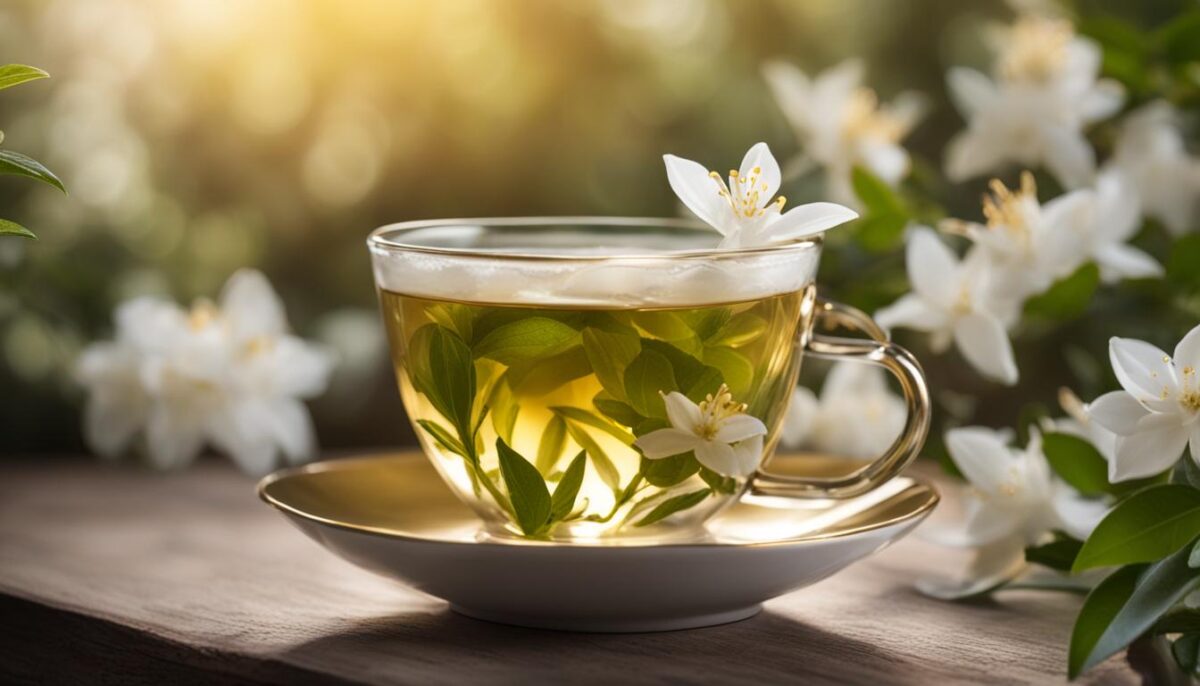
| Benefits of Jasmine Tea | Antioxidant Properties |
|---|---|
| Promotes heart health | Rich in catechins, which may reduce the risk of heart disease |
| Enhances skin health | Antioxidants help protect against cellular damage and promote healthy skin |
| Aids in weight management | Catechins may aid in reducing body weight and promoting fat metabolism |
| Relaxes the mind and body | The floral aroma of jasmine tea can have a calming effect on the nervous system |
| Promotes overall well-being | Drinking jasmine tea can contribute to a sense of tranquility and improved mental well-being |
Embrace the benefits of jasmine tea and indulge in its aromatic allure. Whether you’re seeking a moment of relaxation or looking to enhance your overall health, jasmine tea is a delightful and refreshing choice.
The Power of Rooibos Tea
If you’re looking for a refreshing and healthful alternative to traditional teas, look no further than rooibos tea. This herbal tea, also known as redbush tea, is packed with antioxidants that can promote liver health and overall well-being. With its unique flavor profile and potential health benefits, rooibos tea is a great addition to your tea collection.
Rooibos tea contains a variety of antioxidants, including aspalathin and quercetin, which can help protect against free radical damage and reduce inflammation. These antioxidants may also have liver-protective properties, supporting the health and function of this vital organ. Incorporating rooibos tea into your daily routine may contribute to a healthier liver and improved overall health.
“Rooibos tea is a rich source of antioxidants that can help protect the liver from damage and promote optimal health.”
– Dr. Elizabeth Smith, Health and Wellness Expert
In addition to its potential liver benefits, rooibos tea is also naturally caffeine-free, making it a fantastic choice for those looking to reduce their caffeine intake or enjoy a cup of tea before bedtime. The absence of caffeine in rooibos tea allows you to savor its delicious flavors and experience its soothing effects without any stimulant side effects.
Whether you prefer it hot or iced, rooibos tea is a versatile and tasty beverage that offers a range of potential health benefits. Consider adding this antioxidant-rich tea to your tea collection and enjoy its unique flavor while supporting your liver health and overall well-being.
| Benefits of Rooibos Tea | Antioxidants | Liver Health | Caffeine-Free |
|---|---|---|---|
| Protect against free radical damage | Promote liver health | Enjoy a soothing cup of tea without stimulant side effects | |
| Reduce inflammation | |||
The Medicinal Benefits of Hibiscus Tea
Hibiscus tea, derived from the calyx of the hibiscus flower, has gained popularity not only for its refreshing taste but also for its impressive health benefits. Packed with antioxidants, hibiscus tea can protect against cellular damage and promote cardiovascular health. Let’s explore the medicinal benefits of this vibrant brew.
Cardiovascular Health
Hibiscus tea has been associated with numerous cardiovascular benefits. Research suggests that drinking hibiscus tea may help lower blood pressure, which is a risk factor for heart disease. A study published in the Journal of Hypertension found that consuming hibiscus tea had a significant lowering effect on both systolic and diastolic blood pressure levels. Additionally, hibiscus tea has been shown to reduce LDL cholesterol levels, known as the “bad” cholesterol, and increase HDL cholesterol levels, the “good” cholesterol.
Antioxidant Power
Hibiscus tea is rich in antioxidants, including flavonoids and anthocyanins, which can help protect the body against oxidative stress and inflammation. These antioxidants neutralize harmful free radicals, reducing the risk of chronic diseases such as cancer and diabetes. Hibiscus tea’s antioxidant properties also extend to its potential anti-cancer effects. Test-tube studies have shown that hibiscus extracts can inhibit the growth and spread of cancer cells, although further research is needed to confirm these findings.
Other Health Benefits
Aside from cardiovascular health and antioxidant power, hibiscus tea may offer additional health benefits. Some studies suggest that hibiscus tea may help with weight management by inhibiting the production of fatty acids. Its anti-inflammatory properties may also contribute to reduced inflammation and improved overall well-being. Furthermore, preliminary research has indicated that compounds found in hibiscus tea could have potential antimicrobial and anti-inflammatory effects, providing further support for its medicinal properties.
| Health Benefit | Research Findings |
|---|---|
| Cardiovascular Health | Lower blood pressure and cholesterol levels |
| Antioxidant Power | Protection against oxidative stress and inflammation |
| Weight Management | Inhibition of fatty acid production |
| Anti-inflammatory and Antimicrobial Effects | Potential benefits against inflammation and microbial infections |
Enjoy a cup of hibiscus tea to reap its potential health benefits and indulge in its delightful taste. Remember to consult with a healthcare professional before making any significant dietary changes or if you have any specific health concerns.

Lemon Verbena Tea for Weight Management
Lemon verbena tea is a flavorful and refreshing herbal tea that offers potential benefits for weight management. This delightful tea is known for its lemony aroma and taste, which makes it a popular choice for those seeking a delicious and healthy beverage.
One of the key factors that make lemon verbena tea beneficial for weight management is its polyphenol content. Polyphenols are a type of plant compound that possess antioxidant properties and have been associated with various health benefits, including weight loss. Studies have shown that polyphenols can help reduce body weight and body fat by increasing metabolism and promoting the breakdown of fat cells.
In addition to its potential impact on weight management, lemon verbena tea also offers other health benefits. It contains anti-inflammatory properties that may help reduce inflammation in the body, which is important for overall health and well-being. Furthermore, lemon verbena tea is rich in antioxidants, which can protect the body against oxidative stress and support a healthy immune system.
Incorporating lemon verbena tea into your daily routine can be a simple and enjoyable way to support your weight management goals. Remember to pair it with a balanced diet and regular exercise for optimal results. So sit back, relax, and savor the zesty flavor of lemon verbena tea while nurturing your body and promoting a healthy weight.
Benefits of Lemon Verbena Tea for Weight Management:
- Rich in polyphenols that support weight loss by increasing metabolism and promoting fat breakdown.
- Contains anti-inflammatory properties that reduce inflammation in the body.
- High in antioxidants that protect against oxidative stress and support a healthy immune system.
By incorporating lemon verbena tea into your daily routine and embracing a healthy lifestyle, you can enjoy the potential benefits of this delicious tea while working towards your weight management goals.
Black Tea for Antioxidant Benefits
Black tea, derived from the same tea plant as green tea, offers similar health benefits with the additional richness of flavor. It contains polyphenols and antioxidants that can protect against cellular damage and promote overall well-being. One of the key antioxidants found in black tea is theaflavin, which has been shown to have anti-inflammatory and anti-cancer properties.
Research suggests that black tea consumption may help reduce the risk of heart disease and stroke. Studies have shown that the antioxidants in black tea can improve cardiovascular health by reducing cholesterol levels and lowering blood pressure. Regular consumption of black tea may also have a positive impact on blood sugar regulation.
While black tea does contain caffeine, the amount is generally lower than that of coffee. However, it’s still important to consider your caffeine intake, especially if you are sensitive to its effects. Moderation is key, and opting for decaffeinated black tea can be a suitable alternative for those who wish to limit their caffeine consumption.
| Benefits of Black Tea | Antioxidants | Caffeine Content |
|---|---|---|
| Cardiovascular health | Protect against cellular damage | Moderate, lower than coffee |
| Inflammation reduction | Promote overall well-being | Consider caffeine sensitivity |
| Lower cholesterol levels | Opt for decaffeinated black tea |
Incorporating black tea into your daily routine can be a delightful way to enjoy its antioxidant benefits. Whether you prefer it hot or iced, black tea is a versatile and refreshing choice that can complement any time of the day.
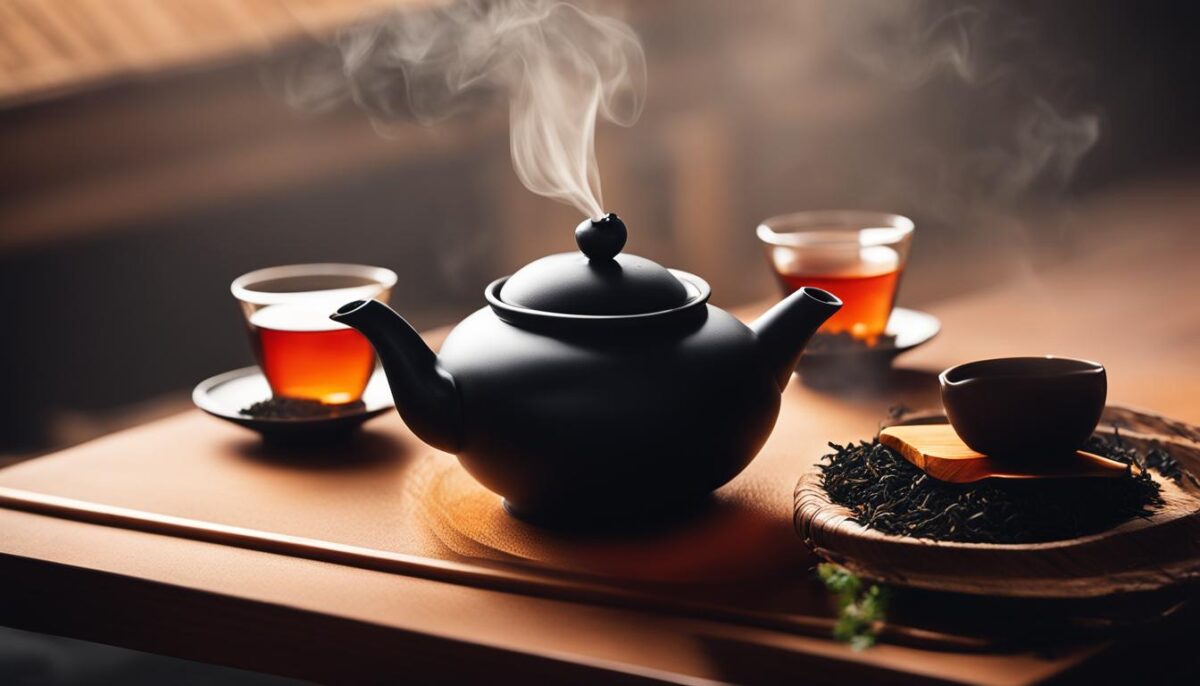
As with any dietary change, it’s important to listen to your body and make choices that align with your individual needs. Consulting with a healthcare professional or a registered dietitian can provide personalized guidance on incorporating black tea into your health and wellness routine.
Finding the Right Tea for You
When it comes to choosing the perfect tea for your taste buds and health goals, there is a wide variety to explore. With so many options available, it’s essential to consider your personal preferences and desired health benefits. Whether you’re looking for a soothing bedtime tea or a refreshing blend for an afternoon pick-me-up, finding the right tea is all about discovering what works best for you.
Before making your selection, think about the flavors you enjoy and the specific benefits you’re seeking. If you prefer herbal teas, chamomile or ginger tea may be a good fit. Chamomile tea is known for its calming properties and can promote better sleep, while ginger tea is excellent for soothing nausea and aiding digestion.
If you’re a fan of more robust flavors, green tea or black tea might be your go-to options. Green tea is rich in antioxidants and offers various health benefits, including enhanced cognitive function and protection against age-related damage. On the other hand, black tea provides similar health benefits with a stronger flavor profile, making it a great choice for those who enjoy a bolder taste.
Remember, experimenting with different teas is part of the fun! Don’t be afraid to try unique blends or explore tea shops that offer a wide selection. By finding the teas that align with your taste preferences and health goals, you can create a daily ritual that not only enhances your well-being but also brings you immense enjoyment. So take a moment to sit back, relax, and savor the delightful world of tea.
Tea Flavors and Their Benefits
| Tea Flavor | Health Benefits |
|---|---|
| Chamomile | Promotes sleep, supports immunity |
| Ginger | Relieves nausea, aids digestion |
| Green | Enhances cognitive function, protects against age-related damage |
| Black | Rich in antioxidants, provides a boost of energy |
Source: Our Tea Experts
Using Tea in Cooking and Beyond
Tea is not just for sipping! Its versatility extends beyond the teacup and can be used in various ways to enhance your culinary creations. From infusing flavors into grains and marinades to adding a unique twist to desserts, tea can elevate your cooking and bring a delightful touch to your dishes.
One popular way to incorporate tea into your cooking is by using it to flavor grains such as rice or quinoa. Simply brew a strong cup of your favorite tea and use it as the cooking liquid for the grains. This infuses them with subtle notes and adds a hint of complexity to your meals. Green tea, jasmine tea, or even herbal blends like chamomile can work wonders in adding a fresh and aromatic touch to your grains.
Another creative way to utilize tea in your cooking is by using it to make marinades. The natural flavors and aromas of tea can enhance the taste of meats, tofu, or vegetables. Simply steep the tea in hot water and mix it with your favorite marinade ingredients. Allow your protein or vegetables to marinate for a few hours or overnight, and then cook as desired. The result is a tender and flavorful dish with a unique twist.
Tea can also be infused into desserts, adding a delightful depth of flavor to your sweet treats. From tea-infused ice creams to cakes and cookies, the possibilities are endless. Matcha green tea can lend a vibrant color and earthy taste to ice creams, while Earl Grey tea can impart a subtle citrusy note to cakes. Get creative with tea-infused recipes and explore the delightful world of tea in your desserts.
Table: Tea-Infused Recipes
| Recipe | Description |
|---|---|
| Green Tea Rice | A fragrant and flavorful twist to your regular rice, infused with the goodness of green tea. |
| Chai-Spiced Marinade | A warm and aromatic marinade made with black tea, spices, and a touch of sweetness. |
| Earl Grey Infused Cake | A light and fluffy cake infused with the floral and citrusy flavors of Earl Grey tea. |
| Jasmine Tea Ice Cream | A creamy and refreshing ice cream with the delicate aroma of jasmine tea. |
Experimenting with tea in your cooking allows you to explore unique flavors and expand your culinary repertoire. Whether you’re a tea enthusiast or simply looking to add a touch of creativity to your dishes, incorporating tea into your cooking can elevate the flavors and take your meals to a whole new level of deliciousness.
Enjoying the Benefits of Tea
When it comes to tea, it’s not just about the health benefits; it’s also about the joy and mindfulness it brings. Taking a moment to enjoy a cup of tea can be a simple yet powerful act of self-care. The act of brewing tea, the aroma that fills the air, and the warmth it provides can create a sense of calm and relaxation.
Drinking tea mindfully allows us to slow down and be present in the moment. As we savor each sip, we can fully appreciate the flavors and sensations that tea offers. Whether it’s a delicate floral tea or a bold and robust brew, each cup can be a sensory experience that nourishes both the body and the soul.
“Tea is a reminder to breathe, to take a pause in our busy lives and reconnect with ourselves.” – Unknown
Incorporating tea into our self-care routine can have a profound impact on our overall well-being. It can provide a moment of solace in the midst of a hectic day, allowing us to recharge and find balance. As we prioritize self-care, tea can serve as a gentle reminder to slow down, take a breath, and take care of ourselves.
So, let’s embrace the benefits of tea not just for its health properties, but for the simple joy it brings. Let’s create a ritual around tea, whether it’s finding the perfect mug, experimenting with different flavors, or enjoying a peaceful moment of solitude. Cheers to tea and the mindful moments it brings!

Conclusion – Embracing the Health Benefits of Tea
Tea, with its abundant health benefits, is more than just a beverage. It offers a holistic approach to well-being, enhancing our physical and mental health in various ways. From the antioxidant properties that protect our cells to the relaxation and digestion support it provides, tea is a true ally in our quest for optimal health.
By incorporating a variety of teas into our daily routine, we can experience the diverse flavors and properties that each tea has to offer. Whether we choose chamomile for better sleep, ginger for digestive health, or hibiscus for blood pressure management, there is a tea for every need.
Not only does tea provide these incredible health benefits, but it also gives us an opportunity to practice mindfulness and self-care. Taking the time to savor the flavors, embrace the calm, and enjoy the moment can contribute to our overall well-being.
So let’s raise our cups, embrace the holistic benefits of tea, and elevate our health. With each sip, we nourish our bodies and nurture our souls, creating a path to a healthier and more vibrant life.
FAQ
What are the health benefits of tea?
Tea offers a multitude of health benefits, including antioxidants, immune support, relaxation, and improved digestion.
What is chamomile tea good for?
Chamomile tea is known for its ability to promote better sleep, support immune health, provide anti-inflammatory effects, and relieve premenstrual syndrome.
How can ginger tea help with nausea?
Ginger tea is well-known for alleviating nausea, making it beneficial for pregnant women experiencing morning sickness or individuals dealing with digestive distress. It also has anti-inflammatory properties and can improve digestion.
How does peppermint tea support a healthy digestive system?
Peppermint tea relaxes the intestinal tract, helping to relieve bloating and support healthy digestion. It has been used for centuries to aid digestion and has shown promising results in animal studies regarding its ability to relax gastrointestinal tissues.
Can hibiscus tea help manage blood pressure?
Hibiscus tea has been found to help manage blood pressure in individuals with stage one hypertension, along with lifestyle and dietary modifications. It may also have protective effects against obesity and reduce cholesterol and blood sugar levels.
What are the potential benefits of fennel tea for menopause symptoms?
Fennel tea has been traditionally used to support digestion and ease digestive issues. It may also help alleviate menopause symptoms in postmenopausal women without serious side effects. Fennel contains polyphenols that contribute to its antioxidant properties and may help balance hormones.
What are the health benefits of green tea?
Green tea is rich in antioxidants called catechins, which have been linked to various health benefits. It can enhance cognitive function, protect against age-related damage, and potentially reduce the risk of Alzheimer’s disease and certain types of cancer.
What are the benefits of jasmine tea?
Jasmine tea combines the health benefits of green tea with the added aroma of jasmine flowers. The antioxidants in both green tea and jasmine provide cellular protection and help reduce stress. Drinking jasmine tea has been associated with improved physical well-being and longevity.
What are the health benefits of rooibos tea?
Rooibos tea, also known as redbush tea, is rich in antioxidants and offers similar health benefits to green tea. It may protect liver health, lower blood pressure, relax muscles, and offer potential anti-cancer properties. Rooibos does not contain caffeine, making it a safe choice for evening consumption.
How can hibiscus tea improve cardiovascular health?
Hibiscus tea contains antioxidants that can protect against cellular damage and improve cardiovascular health. It has been associated with lower blood pressure, reduced cholesterol, and potential anti-cancer effects. Other studies have explored its role in inhibiting tumor cell growth.
Can lemon verbena tea help with weight management?
Lemon verbena tea has been recognized for its potential role in weight management due to its ability to decrease the formation of fatty acids. Its polyphenols contribute to its antioxidant properties and may offer additional health benefits, such as reducing inflammation and supporting overall well-being.
What are the antioxidant benefits of black tea?
Black tea, derived from the same tea plant as green tea, offers similar health benefits with the additional richness of flavor. It contains polyphenols and antioxidants that can protect against cellular damage. Black tea generally has higher caffeine content than green tea, so it’s important to consider your caffeine intake.
How do I choose the right tea for me?
When choosing tea, consider factors such as caffeine content, flavor profiles, and the specific benefits you’re looking for. Experiment with different teas to find the ones that suit your taste preferences and health goals.
How can I incorporate tea into cooking and other uses?
Tea can be used in various ways beyond just brewing a cup. You can incorporate tea into cooking by using it to flavor grains, make marinades, or infuse desserts. Tea also offers versatility in creating refreshing iced teas, tea cocktails, or even skincare products.
How can tea enhance my overall well-being?
Sipping tea can be a mindful and comforting experience. Taking the time to enjoy your tea, savor the flavors, and embrace the calm it brings can help promote overall well-being. Incorporating tea into your self-care routine can enhance your lifestyle.


